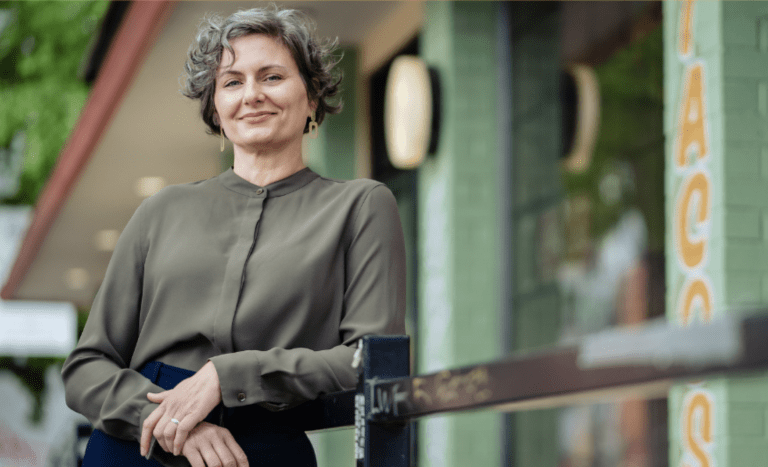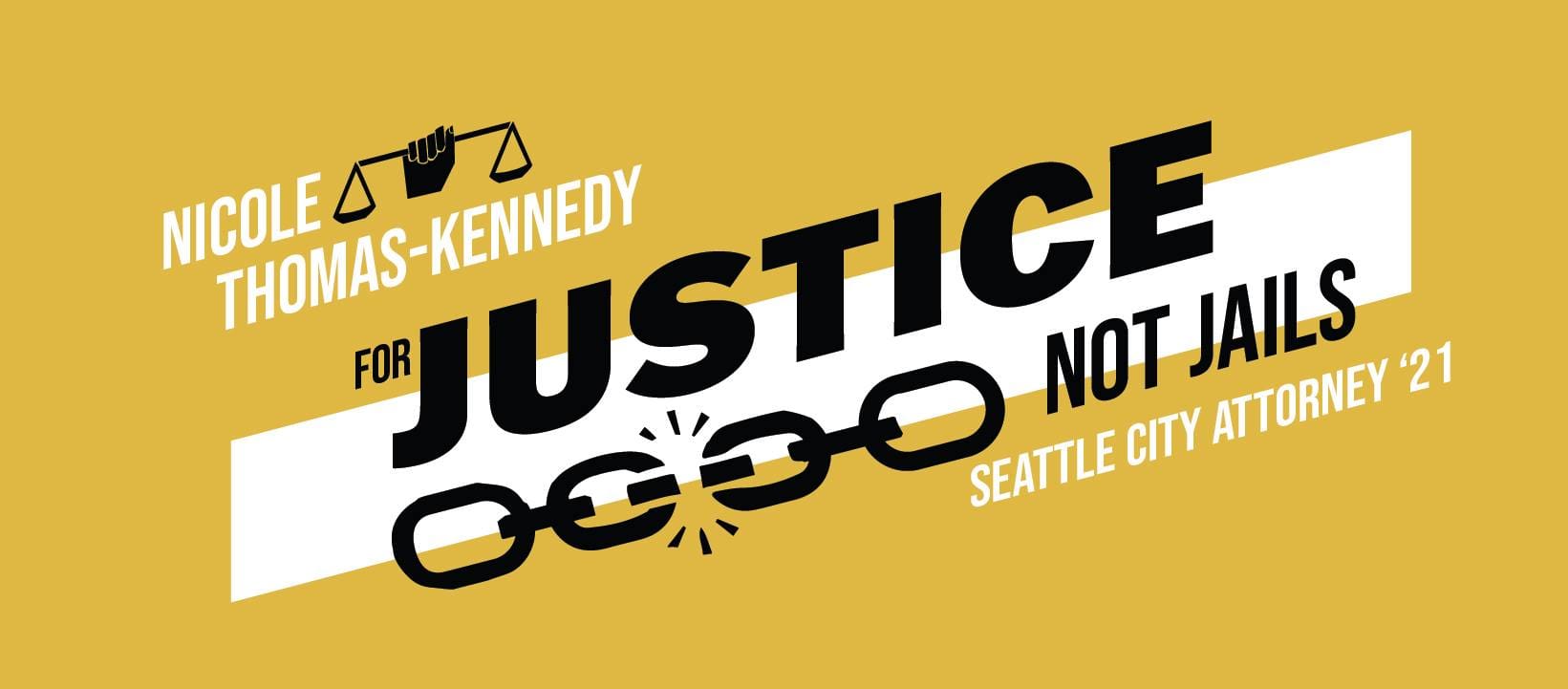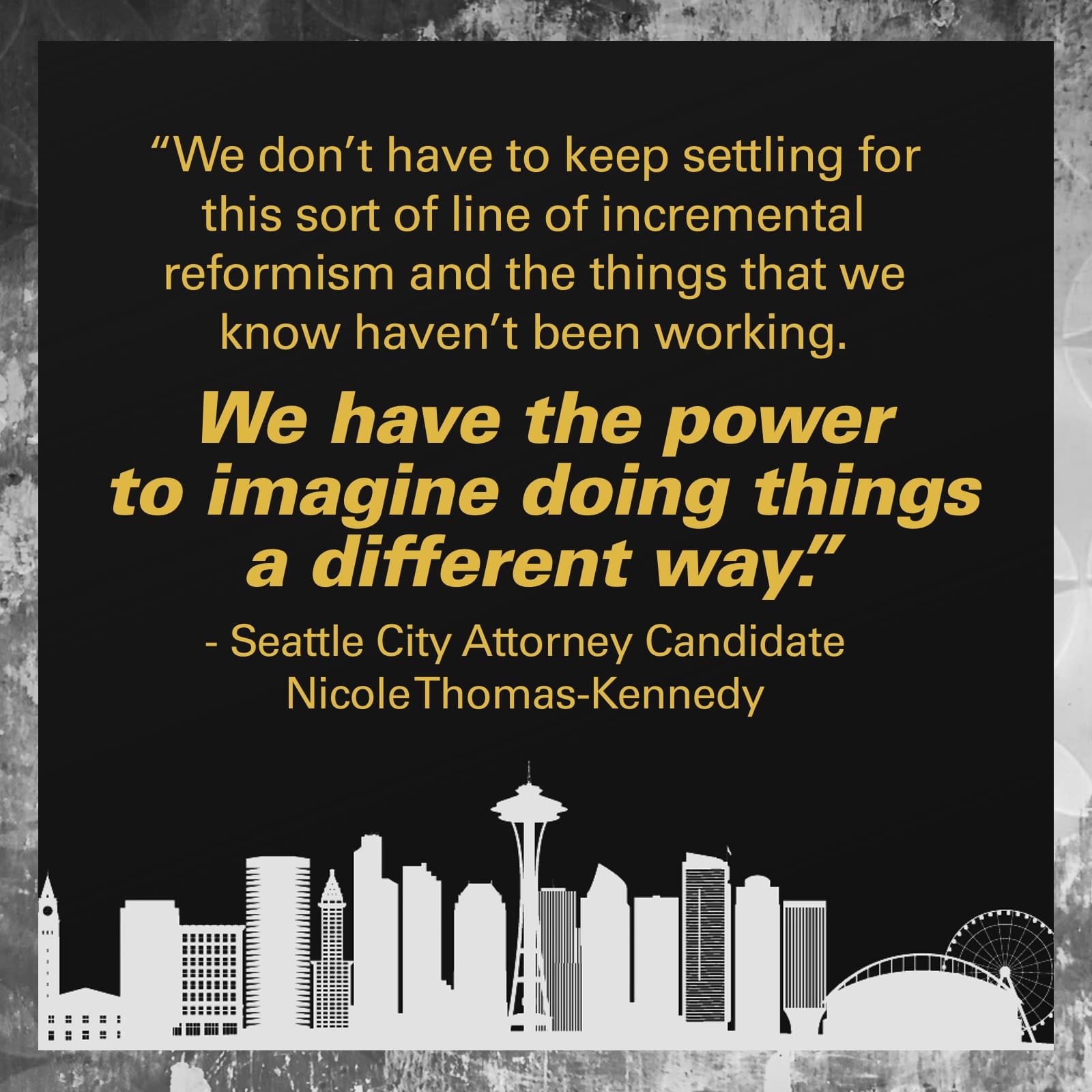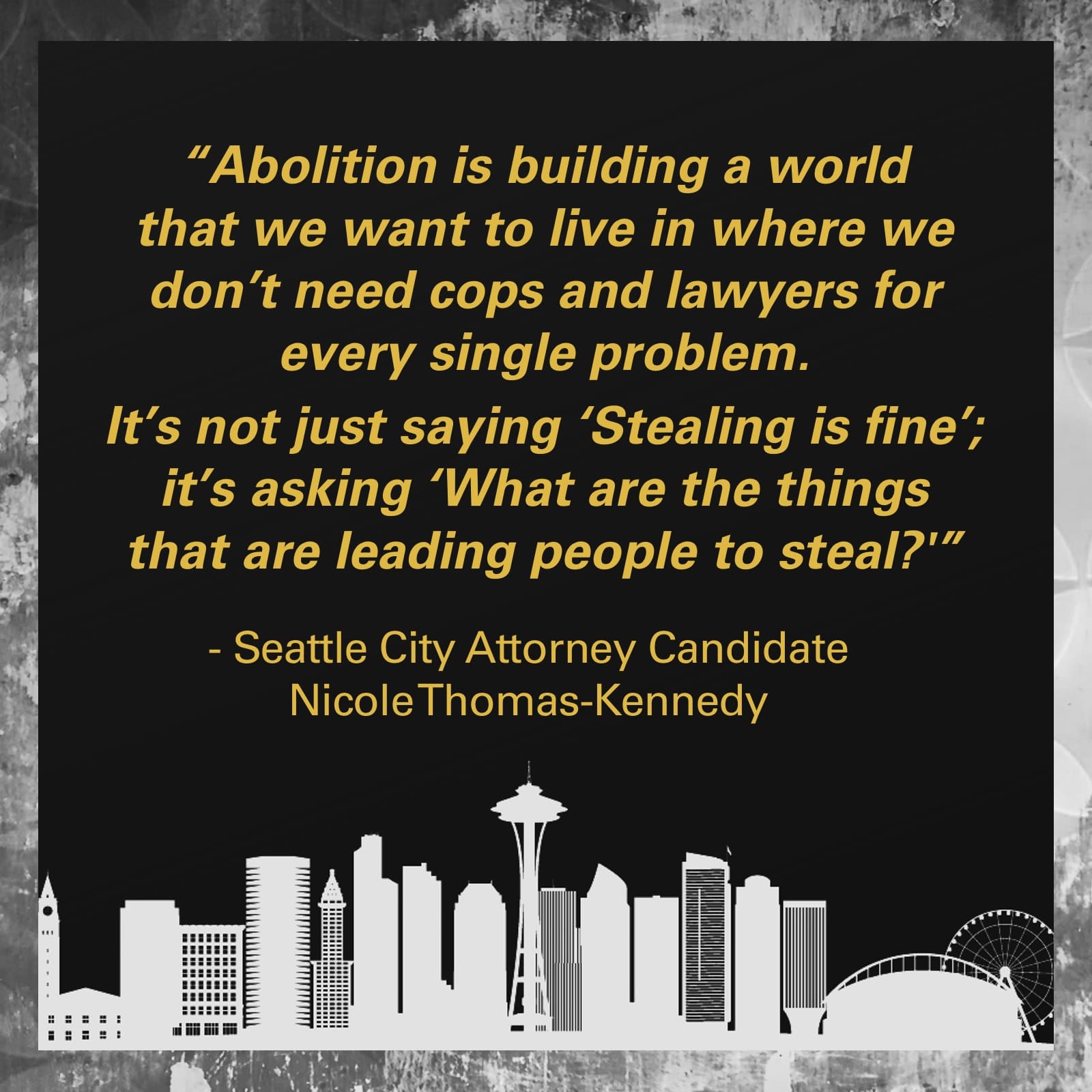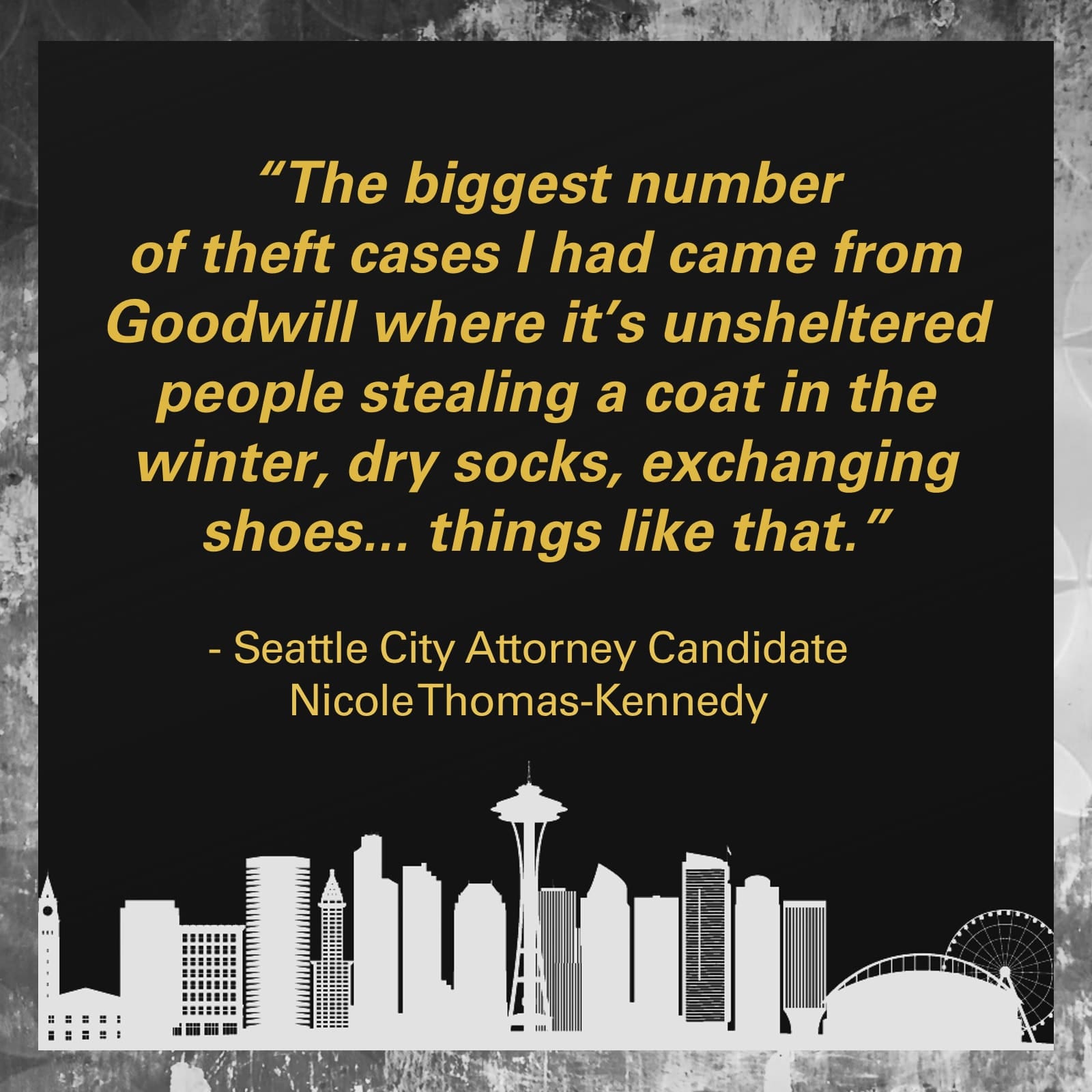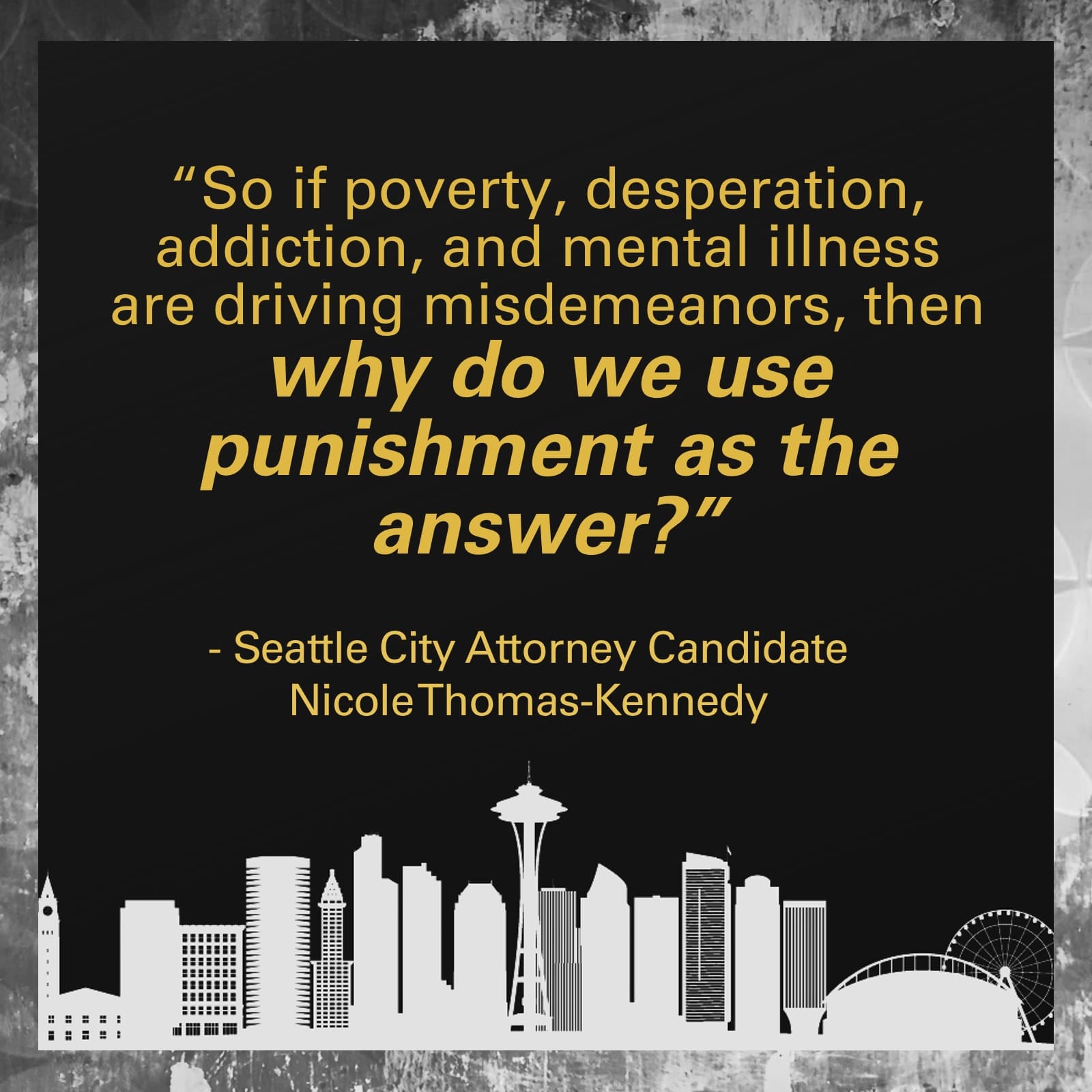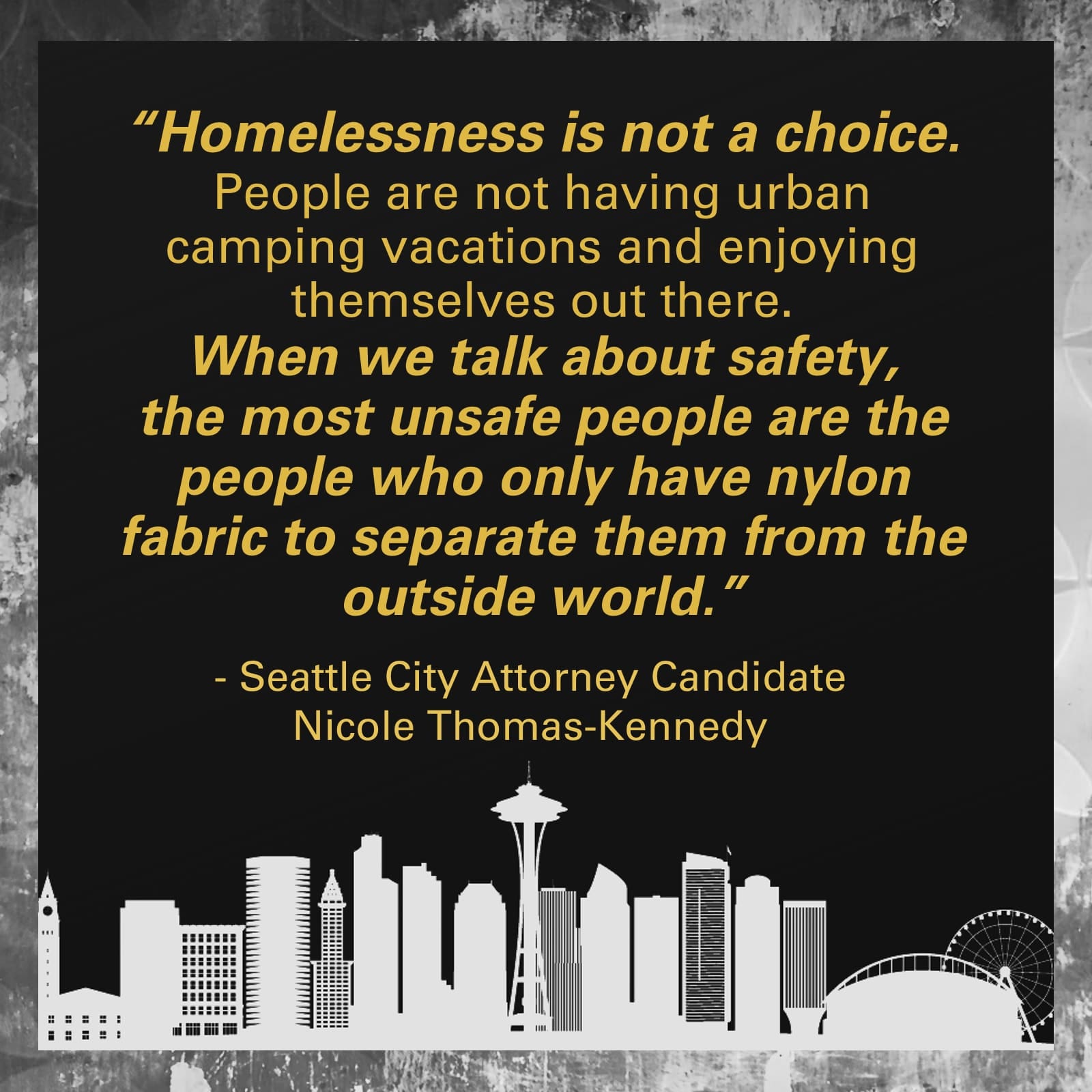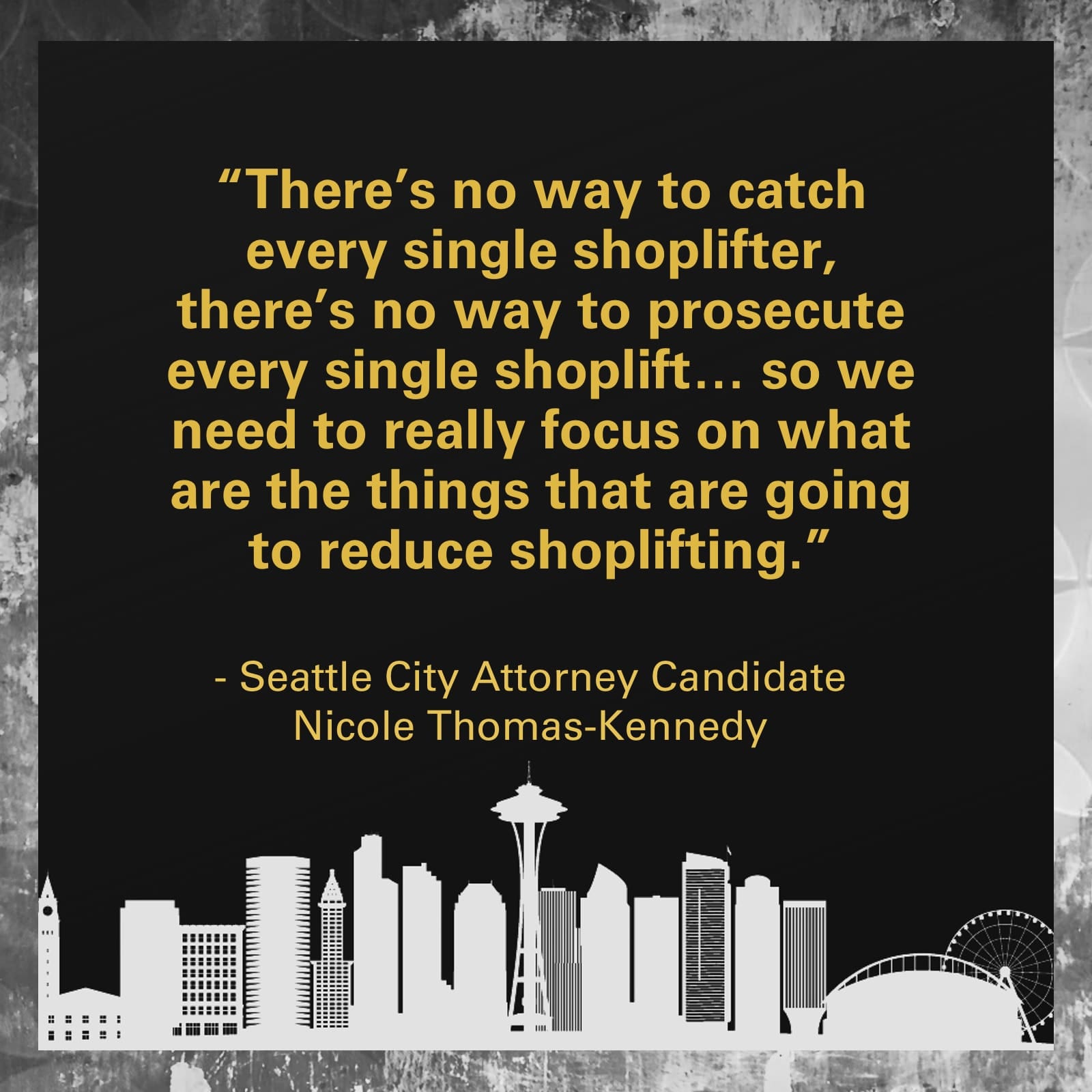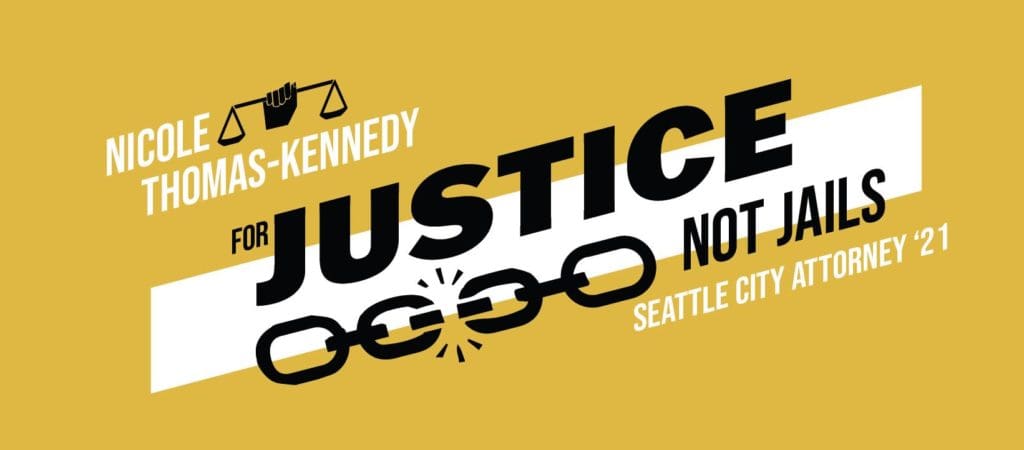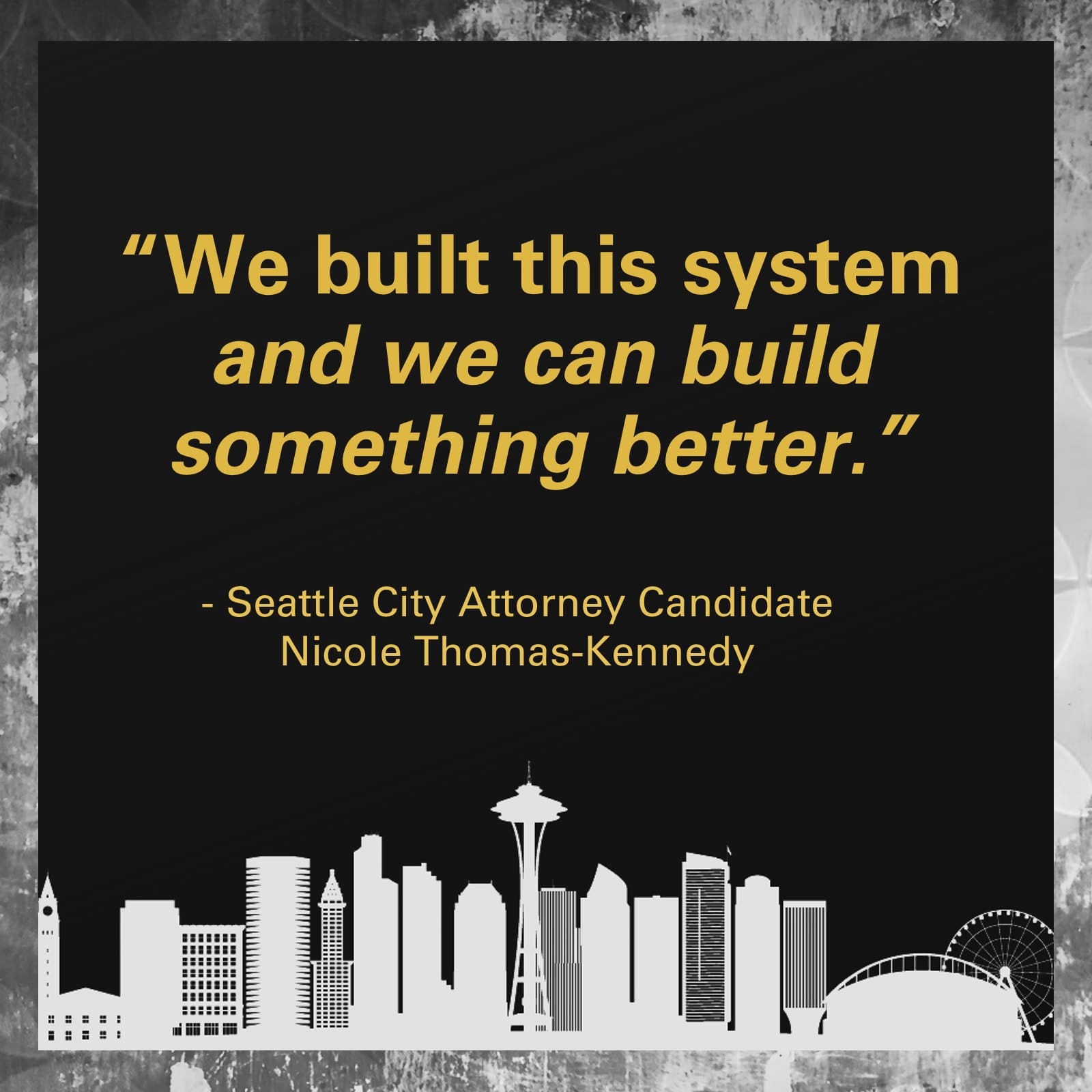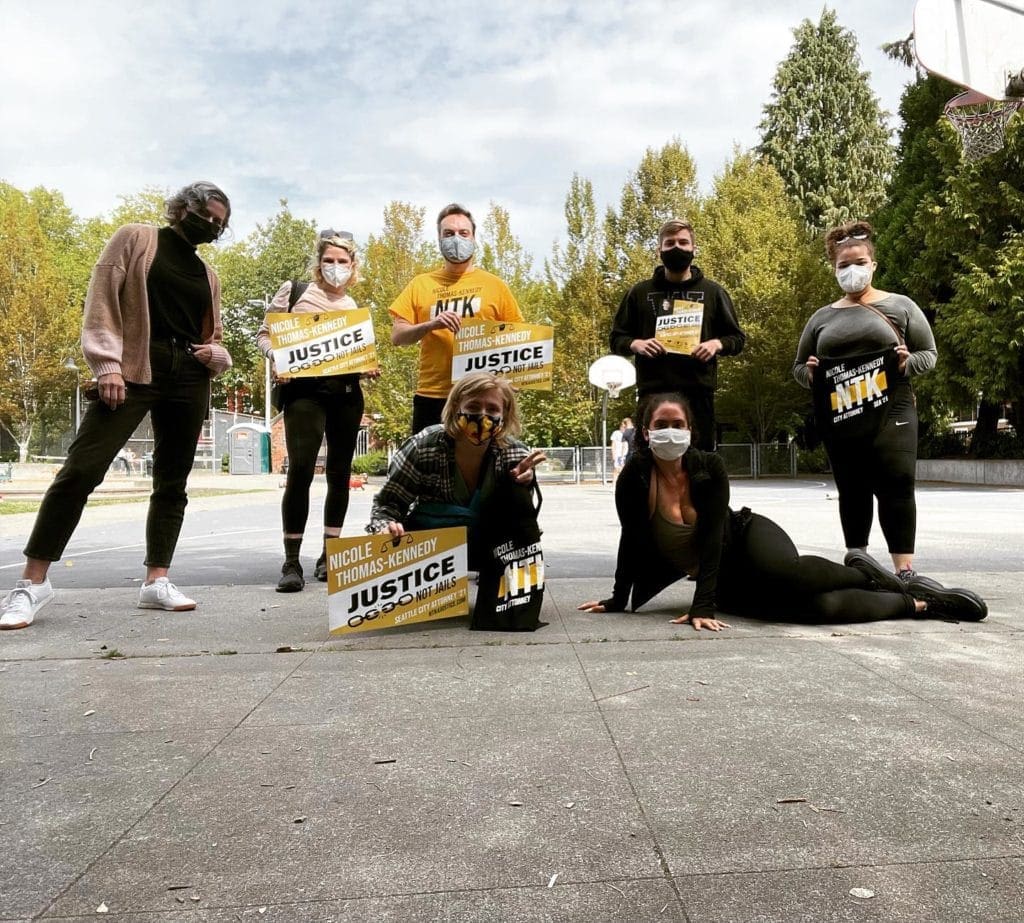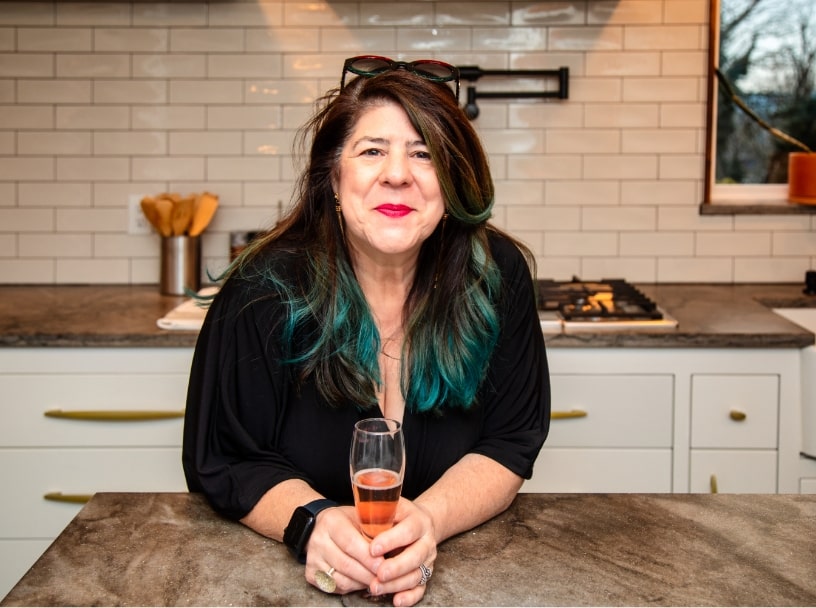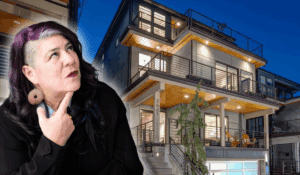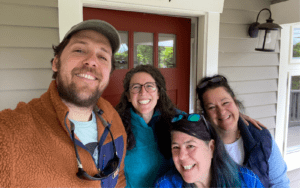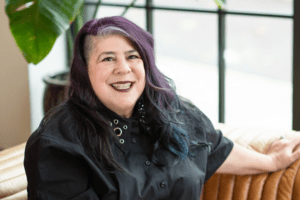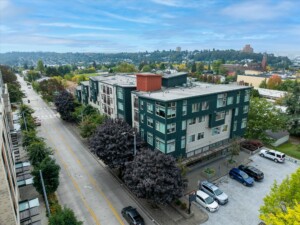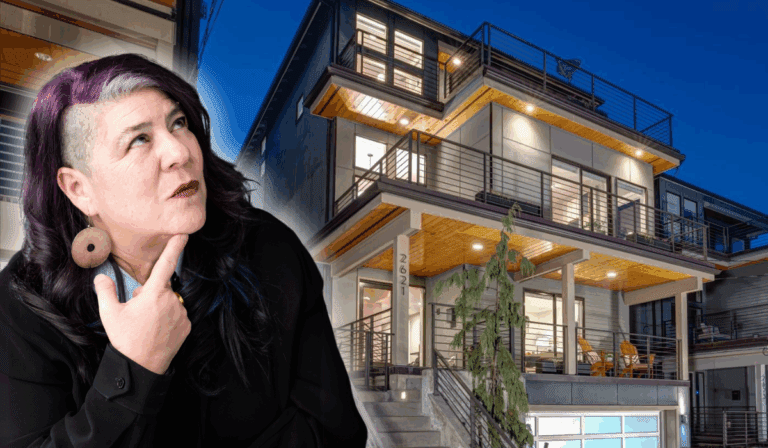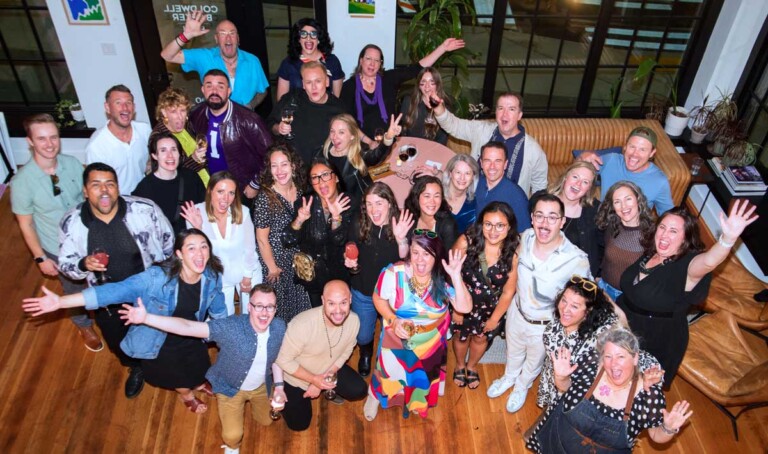The Monday after the Primary in August we were able to be one of the first people to interview Nicole Thomas-Kennedy. She had made it to the finals with a very compelling approach to how to deal with misdemeanor prosecutions in the city of Seattle.
Full disclosure. Our team was super impressed with Nicole’s platform during the primaries and voted for her.
How Did We Get Here – The Primary
We knew that Nicole Thomas-Kennedy would make it through the primaries. However, we did not think she would be running against the super rightwing “I-have-no-real-experience-in-this” issues lady in the general election. Honestly, we were excited for a race where we could have an honest conversation about how to have a more empathetic and humane way of approaching our growing unhoused population. Little did we know that in the General Election, Nicole would be running against Republican Anne Davison. Nicole is an abolitionist candidate (more on exactly what that means in a moment). And what Nicole is proposing is exactly what everyone on Team Diva has been hoping for.
What Did We Learn From Our Interview
In this interview with Nicole, we’re learning more about her abolitionist platform and how she plans to implement practical solutions to change our city for the better. Oh, wait! Abolitionist, what is this? Do not worry we will dive in deep with NTK/Nicole. I admit I was a little confused myself.
Get your reading glasses on, grab your favorite beverage, and let’s dive in together on this long read.
Team Diva Interviews Seattle City Attorney Candidate Nicole Thomas-Kennedy
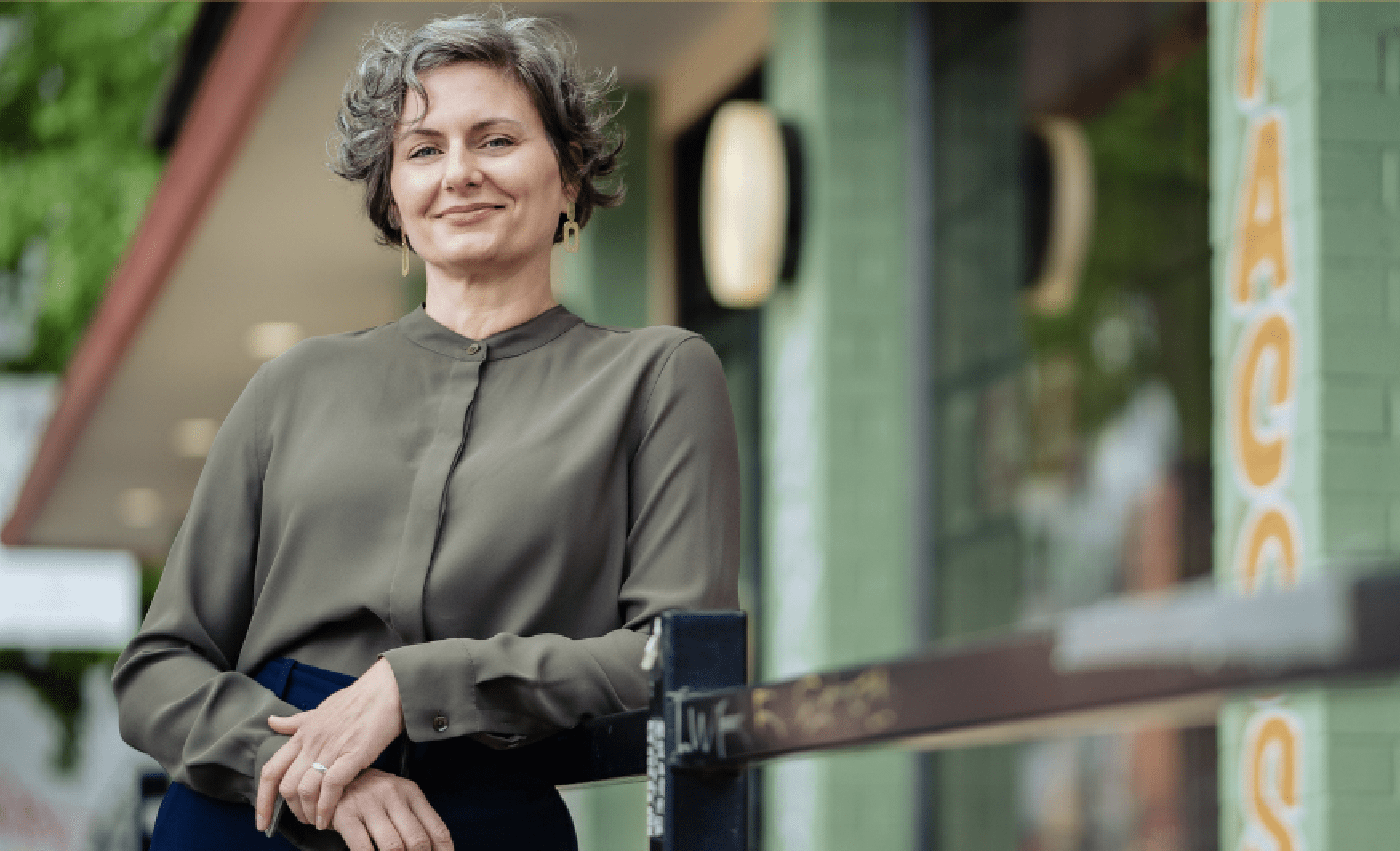
This summer, Team Diva interviewed Nicole Thomas-Kennedy. We asked her what abolition is and what it means to her. We also asked Nicole what exactly the City Attorney is in charge of doing and how this role has contributed to perpetuating a senseless cycle of poverty, homelessness, addiction, mental illness, and more. In addition to identifying some of the biggest problems Seattle faces, Nicole also shared her proposed solutions with us.
Why Did Nicole Thomas-Kennedy Decide to Run for City Attorney?
Nicole Thomas-Kennedy is running for Seattle City Attorney in the November 2021 General Election taking place on November 2, 2021. City Attorney is a position that is near and dear to Team Diva’s hearts as we strive for a city that is more equitable for all. Nicole is a former public defender. And she brings real-life experience to this position as a public defender. She has seen first-hand how our current system of punishing misdemeanors simply does not work to prevent future crimes.
An Example of How Our Misdemeanor Prosecution System is Broken
A perfect example of this is someone who is struggling to make rent, is out of money, and has to steal something from a grocery store in order to eat. Suddenly that person is charged with a misdemeanor. In the process of being prosecuted for that misdemeanor, that same person loses their job because they have to take time off from work for court. In the words of Team Diva, it is a hot mess that makes no sense!
Why Did Nicole Run?
Nicole saw that City Attorney Pete Holmes was running unopposed and she thought that someone should do something. People pointed out that Nicole could be that someone. Sometimes you are that person if you like it or not. Nicole decided to step up and run for the position in order to further the conversation about equity and justice in the way we prosecute people in Seattle.
“I wanted to put that voice out there that there are other alternatives. Especially if we’re professive—we don’t have to keep settling for this sort of line of incremental reformism and the things that we know haven’t been working. We have the power to imagine doing things a different way.”
We can go beyond simply reworking ideas like police accountability or racial justice, etc. After all, we’re still largely in the same place after decades of “working on” these things.
What is Abolition and What Does This Mean For the City Attorney’s Office?
Team Diva:
“Abolition can be a triggering concept for people who have been raised with a 1990s law and order concept. Can you clarify what abolition means to you?”
Nicole Thomas-Kennedy:
“First, I understand why people are freaked out by the concept of abolition. I think that the way it’s generally thought of is that all crimes become legal and we have this ‘Thunderdome’ happening, where nobody cares about victims. And nobody cares about safety and it’s just this free-for-all of chaos. And I would be afraid of that too! That is not what I’m advocating for and not what I want.
What Is Abolition?
“Abolition in the current sense—it’s a movement that’s been growing since mass incarceration has been growing. But abolition is building a world that we want to live in where we don’t need cops and lawyers for every single problem. It’s not just saying ‘stealing is fine’; it’s asking ‘what are the things that are leading people to steal? What can we do about the root causes of those things? How can we actually solve those problems?’
“It’s a recognition that when it comes to public safety, a lot of people don’t feel safe, unfortunately. Yet the U.S. incarcerates more people than anywhere else in the world. Mass incarceration is this social experiment that we have taken all the way. Nobody does it as we do—we have 5% of the world’s population and 25% of the world’s prisoners. Nobody [except the United States] does it like this. And I think if that was a working strategy then this would be the safest country on earth, and it’s simply not.
Abolition says ‘Hey, maybe we could make sure people have their basic needs met, make sure that we have different means of resolving conflicts, work on things that actually prevent crime’ and allow people to flourish instead of being ok with crime happening as long as we can punish it after the fact
“Abolition acknowledges the system already isn’t working to create what it says it’s supposed to be doing, but it also acknowledges that the criminal system is rooted in slavery, workers strikes, imprisoning poor people, and imprisoning disabled people. And those are the things it still is doing today.
What Reform Will Look Like
“Reforming or incremental tweaks to the system are not going to change that—the foundation of it is rotten. So this century of prison reform, these decades of police reform, and all of these things have kind of led us back to the same place because this is the function of it. So when we talk about public safety… First, the current system isn’t available to everybody. Second, the current system is a lot more dangerous to some people than other people. And third, it’s just entrenching all of these racist, ableist ideas and targeting certain people.
“Abolition says ‘Hey, maybe we could make sure people have their basic needs met, make sure that we have different means of resolving conflicts, work on things that actually prevent crime’ and allow people to flourish instead of being ok with crime happening as long as we can punish it after the fact.”
What Does the Seattle City Attorney Actually Do and How Does it Perpetuate a Broken System?
Team Diva:
“Many people think that the City Attorney is in charge of all the prosecuting of crimes in Seattle. Do you mind clarifying exactly what the City Attorney does? What are the problems that you see with the current system of prosecuting misdemeanors in the city and the citizens that are the most impacted?”
Nicole Thomas-Kennedy:
“I’ll answer this mostly through sharing what I saw as a public defender. So, the City Attorney has jurisdiction over misdemeanors which are low-level crimes. People can’t go to prison for a misdemeanor. They can only go to jail, which is a weird distinction. The sentence is less than a year for every misdemeanor. And a lot of time when people talk about different crimes that they’re worried about, they’re talking about felonies. Misdemeanors are things like single shoplifts, simple assault where it’s like unwanted touching, or trespassing (like an unsheltered person sleeping in a doorway). The City Attorney doesn’t deal with rape, murder, car theft, or that type of stuff.
Majority of the People Who Are Being Prosecuted Are Trying to Find Supplies to Simply Live
“I have had many cases of people stealing food, people only identified through shelter IDs. The biggest number of theft cases come from Goodwill where it’s unsheltered people stealing a coat in the winter, dry socks, exchanging shoes… things like that. And in all of these cases, first of all, the retailers usually get their things back. That’s how they know who to prosecute—they’re caught on the way out the door. So the merchants are getting their stuff back, but then the people are going to jail over it.
“90% of the people prosecuted currently in Seattle Municipal Court qualify for a public defender.
“You have to be below the poverty line to qualify for a public defender. So the only people who are being prosecuted there are people who are really poor. As a public defender, all of my clients were either paycheck to paycheck, barely housed, and barely hanging on, living in their cars, or unsheltered. And in every single situation when that person was jailed and prosecuted, it made all of those circumstances worse. And it was those circumstances that often lead to stealing a sandwich, or some shoes, or being in a mental health crisis or things of that nature. There was this constant destabilization of people who were barely hanging on.
An Example of How This System Impacts Real People
“I had a client who was a home healthcare worker who was arrested for something petty and he was living in his car; he lost his car which had everything for his job, so he lost his job. I think there’s this idea that that’s sort of a one-off thing, but that’s actually quite regular. So when we’re talking about reducing crime, there’s nothing about destabilizing someone like that that reduces crime.
And there are lots of people who have ridiculous petty misdemeanor convictions from 20 years ago that can’t become a King County Metro bus driver, or can’t work in certain settings because that’s on their record.
“These are crimes of poverty and desperation generally speaking. What it does do is it makes it harder for a person to get a job. And there are lots of people who have ridiculous petty misdemeanor convictions from 20 years ago that can’t become a King County Metro bus driver, or can’t work in certain settings because that’s on their record. And why, if people are already in desperate circumstances, would we make them MORE desperate?
An Example of How The System Doesn’t Address Mental Health Issues In Our Community
“The same goes for any sort of mental health issue as well. Getting an appointment with a psychiatrist can take months. It can take forever—even if you have insurance. It’s just something that’s not available to people. and so what happens is that even when people reach out for help they can’t get it. Eventually, it devolves into crisis if it comes to that point, and then these people are only given help when they’re so acute that they’re dangerous to themselves or others. Then they’re put in a hospital, they’re maybe put on a bunch of drugs to get to a normal baseline, and then they’re released again onto the street.
“This idea that we can’t reach people who are suffering from poverty, addiction, or mental health issues unless we have the state and cops out there to capture them is ridiculous. We can see who they are. They’re living visibly in our communities, and there’s no need to ensnare them in this system to give them services. Our current system takes these big social problems and public health problems and atomizes them into individual personal failings. It doesn’t work.”
How Do We Solve What Is Not Working In Our Current Cycle of Criminalizing Poor People and Making them Homeless?
Team Diva:
“Many people are new to learning about all of this. What’s another way that things are currently not working in our current system?”
Nicole Thomas-Kennedy:
“There are very practical things. Trespass is a super common thing to be charged with, and most of the time it’s unsheltered people who are really not allowed to be anywhere in our society. Sleeping under an awning, stuff like that—there’s just nowhere to exist. So the idea that we should prosecute and jail someone for not having a place to exist instead of giving them a place to exist just doesn’t make sense on any level.
“The whole thing with prosecution of poverty and prosecution of disability and things like that is that it doesn’t address the root cause of anything. So if poverty, desperation, addiction, and mental illness are driving misdemeanors, then why do we use punishment as the answer?
The Jail System is Not a Place to Deal With a Mental Health Crisis
“There’s nothing about being in a jail cell for two weeks in active psychosis that makes someone more mentally healthy. Isolating and traumatizing someone with addiction issues clearly doesn’t help and there’s lots of evidence to show that this is not a helpful way of doing things. What I hear a lot is that people want to solve these problems. But we’re going to have to look at them differently. This isn’t a cost-benefit analysis where everyone has an equal amount of agency and access to resources.”
How Can We Be a Truly Compassionate in Seattle and Be Safe?
Team Diva:
“Something we hear from many people is that they want to have compassion for these situations. But they also want to feel safe. How do you respond to these people and what does a transition look like?”
Nicole Thomas-Kennedy:
“I get that, and yes that makes a lot of sense. I think there’s this sort of false choice between punishment and safety. Or being self-interested and being safe. Or being compassionate and being safe. I really think that’s a false dichotomy because a complete lack of compassion or policies driven by a lack of compassion is how we got here.
The Myth About Homelessness is Impacting Policies that Increases Our Unhoused Population
“Homelessness is not a choice. People are not having urban camping vacations and enjoying themselves out there. When we talk about safety, the most unsafe people are the people who only have nylon fabric to separate them from the outside world. And it’s the same with people who suffer from mental health issues—I get that it makes people uncomfortable and there are things that have happened of course. But the most unsafe people are the people who are actually suffering in those conditions.
I really think that’s a false dichotomy because a complete lack of compassion or policies driven by a lack of compassion is how we got here.
“In order for us to actually move towards a society where we all feel safe, we’re going to have to have compassion when we look at these problems. The way we’ve been looking at it for so long is that we don’t have to worry about anybody else; that we’re not interdependent. I can close my door and it’s not my problem anymore. In a way, the pandemic really blew that idea apart—even though we can be individuals and some of us have better ability to insulate ourselves from others, it doesn’t change the fact that we are all interdependent on each other for our survival.
Punishment is Not Always the Answer
“Focusing on punishment instead of meeting people’s needs is how we got here. It’s not so much that in order to be safe we have to be mean or cruel; I think it’s the cruelty that led us to this place. In order to solve these problems, we need to have a lens of compassion and not just this ‘You made poor choices, now you’re here and you must suffer.’ That’s clearly not what’s going to help the situation. We can’t lock everybody up. I mean we really can’t. And even if we could, it would break the bank. It costs almost 3x more to put someone in jail for a year than it does to put them in a hotel room, which is actually going to create long-term safety and stability. That’s what we need to be focusing on.”
How Shoplifting Has Affected Small Business Right Now?
Team Diva:
“We’ve heard some people voice their concerns about small businesses. What do you say to people who are concerned that small businesses will suffer if misdemeanors are not prosecuted?”
Nicole Thomas-Kennedy:
“The vast majority of shoplifting cases are from places that have loss prevention officers and high definition security systems. The thing is, with single shoplifting, no one knows who shoplifted if they got away with it. So if the person isn’t caught, then there’s really no prosecution. That’s number one. Second, it’s not small businesses that have access to justice right now, if you want to call prosecuting shoplifters ‘justice.’ That’s just not really an option.
Current System is Built for Big Multinational Corporations and Not Small Local Businesses
“What we’re left with is big multinational corporations who are in the best position to absorb losses—who get their merchandise back—are the people that the city spends money prosecuting on behalf of. The idea is if you prosecute shoplifters, this will deter shoplifting. And does that work for small businesses? I mean, it doesn’t work for big businesses—people are still shoplifting. But it definitely doesn’t work for small businesses either.
“What I would like to do is figure out what the root causes are. If people are struggling with mental health, with addiction, with poverty… why not address those things? Those are the things that are actually going to reduce shoplifting. Most people who shoplift are completely clear on the understanding that they could be jailed for it, yet they do it anyway. Why? That’s the bigger question. There’s no way to catch every single shoplifter, there’s no way to prosecute every single shoplift… so we need to really focus on what are the things that are going to reduce shoplifting. And I think it’s more important for small businesses than anyone. Right now they don’t have any recourse.”
What Are the Solutions? Solutions Begin With Changing the Conversation, Shares Nicole Thomas-Kennedy for Seattle City Attorney
Team Diva:
“What are the solutions you will bring to this system? What would you do differently?”
Nicole Thomas-Kennedy:
“I think the biggest thing I would do differently is to change the narrative. Pete Holmes openly acknowledged that prosecuting theft and trespassing isn’t going to result in a reduction in those things by and large. Yet it’s something he continued to do, which I found confusing.
“Abolition is not saying ‘I don’t give a crap about what happened to you.’ It’s about saying ‘This happened to you, it’s wrong, you were harmed, what can we do to make you whole, and what can we do to make sure this doesn’t happen again.’
What Nicole Thomas-Kennedy in the City Attorney’s Office Would Look Like
Specifically, I would take a varied versus one size fits all approach that is based on building community-based/horizontal power:
The Current System is Racist:
Recognize that the system is both racist and anti-poor. Currently, Black people are 5 times more prosecuted, Indigenous people are prosecuted 6 times more than white people. 90% of those prosecuted are impoverished enough to qualify for a public defender – and acknowledge that this is not justice. Use the office to build community power, not State power.
Eliminating the Use of the Office to Create Homelessness:
Use prosecutorial discretion to stop making people homeless and destitute by charging them for minor crimes that can be better dealt with by meeting basic needs. Those needs being access to food and shelter and healthcare and victim compensation.
Create a Victims Compensation Fund:
A victims compensation fund for individuals and small businesses that are unable to get restitution for theft because the person who stole has no ability to pay.
Bring the Community and Restorative Justice to the City Attorney’s Office:
Support and resource community-driven accountability and restoration process led by skilled navigators. These navigators would provide support through programs like Restorative Community Pathways. This way the community has a way to deal with its problems that don’t involve cops and lawyers. // Here is a good resource on what this would look like >
Expand Diversionary Programs:
Programs like Choose 180 have a proven track record of intervening and course-correcting someone who might be involved going on a path of crime.
Be Survivor Centered:
Understanding that the most dangerous time in an abusive relationship is when someone tries to leave. Instead of focusing on conviction and asking for the blanket no-contact orders that often leave the survivor bereft (financially, as well as in childcare and transportation issues). Focus on things that survivors have been saying they need for years in order to escape dangerous relationships. Which is housing, childcare, transportation, and mental health support. Expand victims’ advocacy services within the office. And give back some of the millions used to prosecute poverty to be used to fund survivor services. Empower those who have suffered abuse by taking a varied and nuanced approach where prosecution is one of many options instead of a one-size-fits-all.
Provide a Place of Safety for those Experiencing Abuse:
Many people do not seek resources when they are experiencing abuse because they might be undocumented or uncomfortable with the police. Let’s dedicate resources to supporting all people and provide a place of respite and safety.
Proactively Deal with the Mental Health and Substance Abuse Issues in Our Community:
We all know we are in a massive crisis with our citizens who are unhoused. We need to stop spending so much money on lawyers and prosecutors charging for small crimes and actually deal with the root problem of many of these issues. Let’s stop wasting money paying lawyers to do things they are not qualified to do. Namely issues of mental health and substance abuse issues.
Stop prosecuting mentally ill people for misdemeanors committed while in psychosis. Ask that people in crisis be taken to the hospital instead of locked up in jail for weeks at a time awaiting a mental health evaluation and decompensating further.
Refer those in active addiction to either a harm reduction program or treatment – but only if they are willing. Forced treatment is a waste of everyone’s time and creates a greatly elevated danger of overdose.
Fund evidence-based harm reduction and voluntary treatment strategies.
Divaland Join Us In Supporting Nicole Thomas-Kennedy for Seattle City Attorney
Team Diva:
“How can we support you and your campaign? How can people be a part of the solution?”
Nicole Thomas-Kennedy:
“You can sign up to volunteer for my campaign at NTK4Justice.com. You can also really start to discuss the issue with people that you know. My experience on social media is that people are struggling to understand. There are some people who have the education already or who have read that ‘aha’ article about abolition, then there are other people who are struggling. Especially the people who are saying ‘I want to be compassionate but I also want to feel safe,’ and it’s like ‘Perfect, me too! That’s great. Let’s talk about this.’ I really think having these discussions with people is important.
The Community Support Has Been Surprisingly Positive
“I was so shocked at how much support my campaign got. I thought I would have a blurb in the voter’s pamphlet and I would be the bonkers lady talking about abolition and how horrible misdemeanor prosecution is. The immediate support I received I think really shows that people are already down with this idea. If you talk to them about it, they can get on board. They just need more information and they just need someone they trust to talk to them about it.
“Also, if you’re a part of an organization and want to endorse my campaign or if you want to host a teach-in or something like that, I would really appreciate those things, too. It’s really about getting the message out about what we’re trying to do and what the possibilities are. It’s not a lofty goal. We built this system and we can build something better.”
Endorse, Donate, and Vote for Nicole Thomas-Kennedy for Seattle City Attorney
Join us in supporting Nicole Thomas-Kennedy. During our interview with Senator Joe Nguyen last summer Senator Nguyen said that “Homelessness is a policy decision.” And yes Seattle, we have made numerous policy decisions to destabilize housing, criminalize the poor, and create an environment where people are breaking into condos on Capitol Hill to steal backpacks in order to survive. We are asking you to have some compassion. And understand that the path forward to unwind ourselves from this situation is going to be hard and messy. Change is always messy.
To quote Nicole Thomas Kennedy “We have the power to imagine doing things a different way.”
Additional 2021 Seattle Election Nuggets for You to Consume
Look for our full election guide for the general election. And remember to VOTE on Tuesday, November 2nd.


